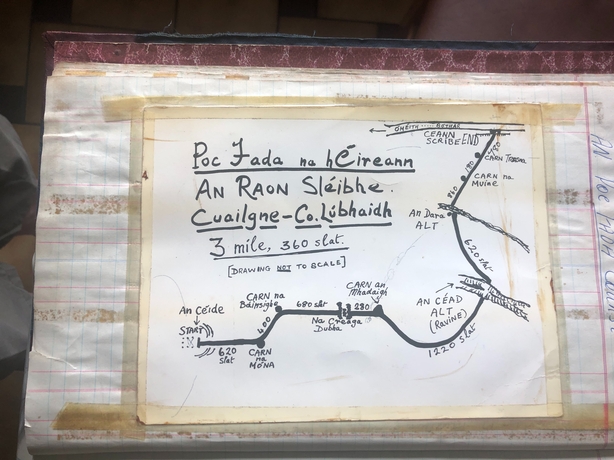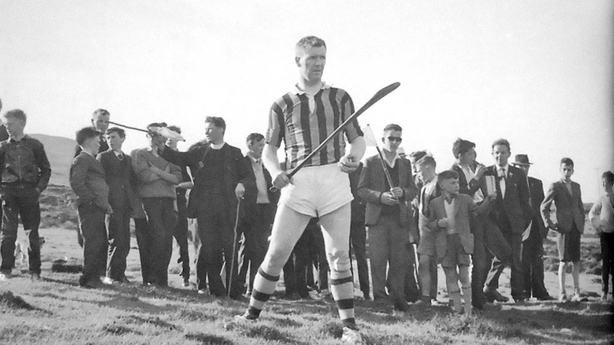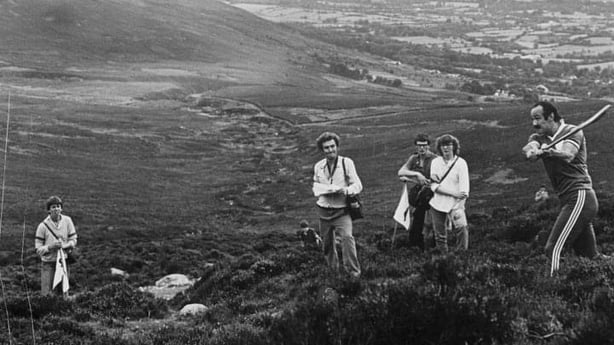Analysis: It's a piece of GAA history and tradition spiritually and culturally rooted in the wild foothills of the Cooley mountains
Like many parts of Irish sports history, Poc Fada has proud and heroic ancient origins. When Cú Chulainn set out to his uncle King Conor Mac Nessa's palace, he shortened the road for himself by hurling the ball ahead of him and thus set up the first cross country long puck record. Likewise, Fionn MacCool is said to have pucked a ball from Fair Head in Antrim to Mizen Head in Cork.
While both stories thrive as myths, we can safely say that the first official Poc Fada competition ("long puck") took place in 1960 in Co Louth. Fr Pól MacSeain, curate of the Fatima Park suburb of Dundalk, "and his helpers" came up with the idea of the competition, which intended to commemorate the hurling exploits of Cú Chulainn, over the hills and plains of the Cooley Mountains in North Louth.

The course, spanning three miles and 320 yards, was located on the ridge of the Cooley Mountains which looks down on one side over Dundalk Bay and on the other the Carlingford Lough. Six young hurlers, mainly from the local Dundalk area, competed and the first winner was Damien Callan, who completed the course in 115 pucks.
The following year saw Poc Fada expand to include competitions for under-13 boys and a trophy known as the Corn Setanta was gifted by the Louth County Committee. 1962 was when the competition truly went national with 17 hurlers from all four provinces competing. The participation of legendary Kilkenny goalkeeper Ollie Walsh gave the event a major boost and the hope for Poc Fada to continue to expand and attract other intercounty players to enter.

The rules of Poc Fada are similar to golf: whoever can hit the sliotar around a pre-marked course in as few pucks as possible is the winner. Unlike other GAA sports, it's a competition where entrants do not have to be particularly strong or fast to succeed and many people continue to compete in Poc Fada long after their hurling and camogie careers are over. The traits of successful players are patience, endurance and skilled practice.
The scheduling of the competition was also key to its development. The Poc Fada finals usually took place on the seventh Sunday after Easter on a day known as Whit Sunday, traditionally regarded in Ireland as a 'fatal and unlucky time’. Thought to be the unluckiest day of the year, people were encouraged to stay indoors and because of this, hurling and football matches did not take place on Whit Sunday. However, the Poc Fada competition prevailed and the freeing-up of the Gaelic Games schedule on that weekend allowed for hurlers to travel and compete.
The course layout stretched from the flat-topped Céide on Annaverna Mountain to where the mountain gave way to the fields of the Mills Family in Aghameen. It was measured using a long rope, and to ensure that participants fully understood the terrain in advance, a scaled model of the mountain and course was made available for the competitor’s perusal upon arrival in Dundalk for the final. A handwritten map of the first course still survives and is in the care of the first Poc Fada winner Damien Callan.
We need your consent to load this rte-player contentWe use rte-player to manage extra content that can set cookies on your device and collect data about your activity. Please review their details and accept them to load the content.Manage Preferences
From RTÉ News in 2021, Poc Fada competition marks 60 years of long pucks in the Cooley Mountains
In its early years, the course was laid out with flags made from old bedsheets. These have since been upgraded to permanent standing stones that mark the route along the course. Initially, the standing stones were painted white, but local farmers mistook them for sheep from a distance, so it was decided to paint the stones yellow. Many of the standing stones have 'An Poc Fada' engraved into them and an arrow pointing towards the direction to take along the circuit. Each competitor was required to bring a team of four with them - one to keep the tally, one to mark the spot where the sliotar lands and two others to assist with each of these tasks. Communication was via walkie talkies operated by the local FCA.
The competition was suspended in 1970 due to a lack of entries and was later revived in 1981. A new circuit course in the Cooley Mountains was decided upon, as part of the old course was under forestry. This course, which is still used for the All-Ireland Poc Fada finals today, is approximately 5km. It has four stages with three turning points - An Céide, Carn an Mhadaigh and An Gabhlan - as well as an added challenge of crossing a ravine on the last leg home.

Similar to the All-Ireland club championships, players must qualify from their county and provincial Poc Fada finals before progressing to the All-Ireland finals. Current county and provincial locations used for Poc Fada competitions include Mount Leinster in Carlow, Curragh Racecourse in Kildare, Glenarm in Antrim, Galtee Mountains in Tipperary and the Connaught GAA Centre of Excellence.
In 1997, discussions began with the Camogie Association to include women in the All-Ireland Poc Fada finals, but it wasn’t until 2004 that the first camogie Poc Fada competition took place to coincide with the centenary. In 2015, Down camogie player Catherine McGourty won the Ulster Poc Fada title on Hen Mountain in Co. Down. There was controversy when Paddy McKillion, the winner of the men’s competition, received a trophy, a medal and a skiing holiday, but McGourty was presented with a medal only. It demonstrated that the gender inequalities that exist within Gaelic games were also present within the Poc Fada competition.
We need your consent to load this rte-player contentWe use rte-player to manage extra content that can set cookies on your device and collect data about your activity. Please review their details and accept them to load the content.Manage Preferences
From RTÉ Radio 1 in 2015, Down's Catherine McGourty has accused the GAA of sexism over awards for the Poc Fada competition
The Poc Fada All-Ireland champions over the years have been mainly goalkeepers, whose skill in conducting puck outs gives them an advantage over outfield players. The record for the Cooley Mountains course currently stands at 48 pucks (an average of 104 metres per puck), achieved by Tipperary's Brendan Cummins in 2004. The current record for the camogie, which is a shorter course, is held by Waterford's Patricia Jackman (also an occasional Brainstorm contributor), who completed the course in 27 pucks in 2013.
In 2015, GAA president Liam O'Neill stated that the All-Ireland Poc Fada Championships had suffered from a lack of imagination. "We've done the same thing for 40 years with the Poc Fada. It never gets the attention it deserves", he said. "The Poc Fada has run out of steam and far from wanting to do any damage to it, I want to develop it".

But in a time when Gaelic games are subject to constant changes in rules, equipment, tactics and venues, the Poc Fada has retained its steady, uncomplicated form, which is part of its appeal. In one of the earliest reports on the event in a national newspaper, the Irish Press stated in 1962 that "The Poc Fada competition has done more to popularise hurling than would an ordinary long puck competition held in a field". There’s a huge difference between a "lack of imagination" and consciously not changing an idea that simply works well as it is.
As a landscape game, the essence of Poc Fada involves a journey through the landscape and competitors are in a contest with the elements of nature, as well as with each other. It is a piece of GAA history that is spiritually and culturally rooted in the wild foothills of the Cooley mountains and nurturing that tradition is as important as any other GAA initiative.
Poc Fada 2024 takes place on August 5th
Follow RTÉ Brainstorm on WhatsApp and Instagram for more stories and updates
The views expressed here are those of the author and do not represent or reflect the views of RTÉ







